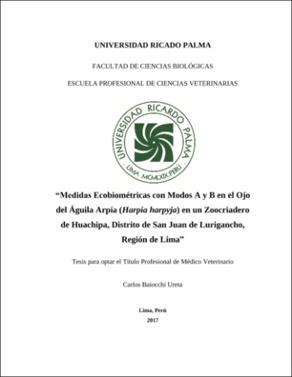“Medidas Ecobiométricas con Modos A y B en el Ojo del Águila Arpía (Harpia harpyja) en un Zoocriadero de Huachipa, Distrito de San Juan de Lurigancho, Región de Lima”
Abstract
La evaluación ultrasonográfica del ojo es una herramienta de diagnóstico oftálmico rutinario en la oftalmología de pequeños animales. Se han establecido parámetros para la biometría oftálmica en algunas especies, sin embargo, existen pocos estudios de este parámetro en la clínica aviar. El presente estudio tuvo como objetivo establecer las medidas biométricas normales de la longitud axial, cámara anterior, cristalino, segmento posterior y pecten de las águilas arpías (Harpia harpyja) adultas en cautiverio en el zoocriadero el Huayco, distrito de San Juan de Lurigancho, Lima-Perú. Se realizaron 24 ecografías oculares en 12 águilas arpías (Harpia harpyja) sin antecedentes de enfermedad oftálmica previa, con un peso entre 7.2 a 8.7 kg. Las mediciones se realizaron en planos sagitales usando una sonda lineal de 15MHz. La biometría en el ojo derecho e izquierdo fueron, respectivamente, 28.6 ± 0.52mm y 28.69 ± 0.65mm para la longitud axial, 5.6 ± 0.48mm y 5.51 ± 0.43mm para la cámara anterior, 5.83 ± 0.19mm y 5.59mm para el cristalino, 17.23 ± 0.17mm y 17.74 ± 0.71mm para el segmento posterior, y 9.27 ± 0.35mm y 9.4 ± 0.71mm para el pecten. No se encontraron diferencias significativas (p>0.05) entre el ojo derecho e izquierdo para ninguna de las biometrías evaluadas.
Ultrasound evaluation of the eye is a routine ophthalmic diagnostic tool in small animal ophthalmology. Parameters have been established for ophthalmic biometry in some species, however, there are few studies of this parameter in the avian clinic. The present study aimed to establish the normal biometric measurements of the axial length, anterior chamber, crystal, posterior segment and pectin of adult harpy eagles (Harpia harpyja) at the Huayco zoocriadero, San Juan de Lurigancho district, Lima, Peru. Twenty-four ocular ecographies were performed on 12 harpy eagles (Harpia harpyja) without precedent of previous ophthalmic disease, weighing between 7.2 to 8.7 kg. Measurements were made in the sagittal planes using a 15MHz linear probe. The biometrics in the right and left eye were, respectively, 28.6 ± 0.52 mm and 28.69 ± 0.65 mm for the axial length, 5.6 ± 0.48 mm and 5.51 ± 0.43 mm for the anterior chamber, 5.83 ± 0.19 mm and 5.59 mm for the crystal, 17.23 ± 0.17 mm and 17.74 ± 0.71 mm for the posterior segment, and 9.27 ± 0.35 mm and 9.4 ± 0.71 mm for the pecten. No significant differences (p>0.05) were found between right and left eye for any of the biometrics evaluated.
Collections
- Medicina Veterinaria [83]


